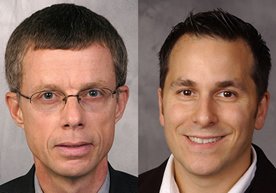Volunteers Needed for Genetic Research Study at SUNY Upstate
Study is co-led by Syracuse alumnus, involves 10 A&S students

Children between the ages of six and 12 and their parents are needed for a new genetic research study at SUNY Upstate Medical University. Funded by the National Institute of Mental Health, the study seeks to classify mental health disorders in children, in hopes of changing the way psychiatric disorders are understood and diagnosed in the future.
The study procedure—in which participants complete a series of questionnaires and computer-based tasks, as well as provide a DNA sample for genetic analysis—takes up to three hours. Each participant will be paid $50. For more information, contact Pat Forken at 315-464-5619.
“We’re recruiting approximately 700 families, or 2,800 individuals, and are looking at a broad spectrum of childhood behaviors, from those of children with no mental health concerns to those who may have health concerns or behavioral problems,” says Forken, a research specialist in SUNY Upstate’s Psychiatric Genetics Lab. “Our goal is to provide a better basis for a new diagnostic system that is less subjective than what it currently used.”
The study is co-directed by Stephen J. Glatt ’96, associate professor of psychiatry and behavioral sciences, as well as neuroscience and physiology; and Stephen Faraone, Distinguished Professor of Psychiatry.
Also involved is Kayla Wagner ’14, a doctoral candidate in clinical psychology in Syracuse University’s College of Arts and Sciences (A&S). She is currently doing an assistantship at SUNY Upstate, where she serves as a research analyst for the study. Her responsibilities include overseeing nine A&S interns: Sandra Agyepong ’16 (biology), Kristin Marie Anders ’15 (biology/Spanish), Christian Battiloro ’16 (biology), Brandon Carlos ’16 (psychology/neuroscience), Totadri Dhimal ’16 (biochemistry), Erin Dickey ’16 (biochemistry), Stephen Glennon ’15 (biology/marketing), Janelle LeMon ’15 (psychology), and Lauren Leonard ’15 (psychology).
Forken says the study is not offered to children or their parents who have neurologic disease or damage; have an uncontrolled medical illness; cannot read, write, or understand English for their respective age group; or have a history of head injuries, with documented loss of consciousness lasting more than 10 minutes.
“We want to help change the way neuropsychiatric disorders are diagnosed in children, moving from a subjective model to one that is rooted in biology,” she adds.
The study procedure—in which participants complete a series of questionnaires and computer-based tasks, as well as provide a DNA sample for genetic analysis—takes up to three hours. Each participant will be paid $50. For more information, contact Pat Forken at 315-464-5619.
“We’re recruiting approximately 700 families, or 2,800 individuals, and are looking at a broad spectrum of childhood behaviors, from those of children with no mental health concerns to those who may have health concerns or behavioral problems,” says Forken, a research specialist in SUNY Upstate’s Psychiatric Genetics Lab. “Our goal is to provide a better basis for a new diagnostic system that is less subjective than what it currently used.”
The study is co-directed by Stephen J. Glatt ’96, associate professor of psychiatry and behavioral sciences, as well as neuroscience and physiology; and Stephen Faraone, Distinguished Professor of Psychiatry.
Also involved is Kayla Wagner ’14, a doctoral candidate in clinical psychology in Syracuse University’s College of Arts and Sciences (A&S). She is currently doing an assistantship at SUNY Upstate, where she serves as a research analyst for the study. Her responsibilities include overseeing nine A&S interns: Sandra Agyepong ’16 (biology), Kristin Marie Anders ’15 (biology/Spanish), Christian Battiloro ’16 (biology), Brandon Carlos ’16 (psychology/neuroscience), Totadri Dhimal ’16 (biochemistry), Erin Dickey ’16 (biochemistry), Stephen Glennon ’15 (biology/marketing), Janelle LeMon ’15 (psychology), and Lauren Leonard ’15 (psychology).
Forken says the study is not offered to children or their parents who have neurologic disease or damage; have an uncontrolled medical illness; cannot read, write, or understand English for their respective age group; or have a history of head injuries, with documented loss of consciousness lasting more than 10 minutes.
“We want to help change the way neuropsychiatric disorders are diagnosed in children, moving from a subjective model to one that is rooted in biology,” she adds.
Media Contact
Ron Enslin
